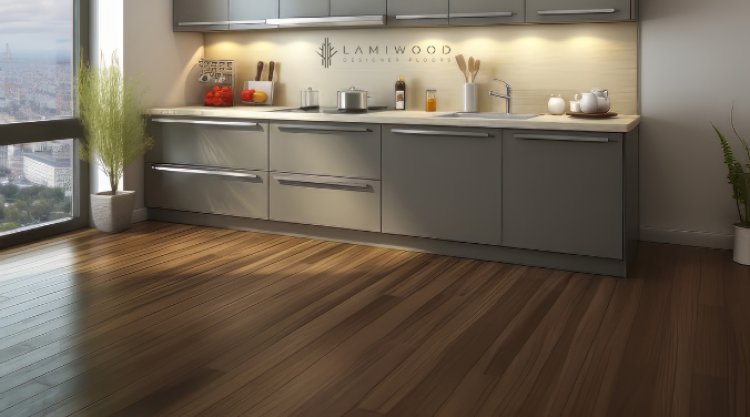Is Wooden Flooring Suitable for Kitchens? Pros, Cons, and Expert Tips
kitchen wooden flooring suitable where spills, moisture, and foot traffic are inevitable? Let’s explore its suitability, pros, cons, and expert tips for ensuring longevity.
Share this Post to earn Money ( Upto ₹100 per 1000 Views )

When designing or renovating a kitchen, flooring plays a crucial role in both aesthetics and functionality. While tiles and vinyl are traditional favorites, wooden flooring is gaining immense popularity for its ability to add warmth, elegance, and charm to a kitchen space. But is kitchen wooden flooring suitable where spills, moisture, and foot traffic are inevitable? Let’s explore its suitability, pros, cons, and expert tips for ensuring longevity.
Why Consider Wooden Flooring for Kitchens?
Wooden flooring instantly elevates the look of any space. Kitchens, often considered the heart of the home, benefit significantly from the natural beauty and versatility of wood. Unlike cold surfaces such as tiles, wooden floors provide a warm, cozy ambiance that enhances the overall appeal of a modern, rustic, or traditional kitchen.
Wooden floors are also gentle underfoot, making them comfortable for long hours of standing while cooking or hosting. With proper care and selection, wooden flooring can be a durable and functional addition to your kitchen.
Types of Wooden Flooring Suitable for Kitchens
Engineered Wood Flooring
Engineered wood is the most suitable option for kitchens because of its layered construction. It consists of a hardwood veneer on top of a sturdy core (like birch), which makes it more resistant to moisture and temperature changes compared to solid wood.
Laminate Wooden Flooring
Laminate flooring offers the appearance of real wood with a protective top layer that makes it highly resistant to spills, stains, and scratches. The laminate wooden flooring is an affordable and practical option for busy kitchens.
Waterproof Wooden Flooring
If you’re concerned about water damage, waterproof wooden flooring, such as hybrid laminated flooring or WPC (Wood Plastic Composite), is a game-changer. It offers a classic wooden look while being highly resistant to moisture, making it ideal for kitchens.
Pros of Wooden Flooring in Kitchens
- Aesthetic Appeal: Wooden flooring adds timeless beauty and warmth to any kitchen. It pairs well with both contemporary and traditional interiors.
- Comfort: Wood is softer and warmer underfoot compared to tiles, which is beneficial for those who spend hours in the kitchen.
- Variety: With options like oak, maple, walnut, and modern finishes, wooden flooring offers a range of styles to suit any décor.
- Longevity: High-quality wooden floors can last decades with proper care and maintenance.
Cons of Wooden Flooring in Kitchens
Moisture Sensitivity: Prolonged exposure to water or spills can damage wooden floors. Without quick cleanups, warping or staining may occur.
Maintenance: Wooden floors require regular care to maintain their finish and prevent scratches.
Cost: Wooden flooring can be more expensive than tiles or vinyl, especially when opting for premium wood options.
Expert Tips to Protect Wooden Flooring in Kitchens
Choose Engineered or Waterproof Options
Opt for engineered or waterproof wooden flooring to minimize moisture-related issues. These options offer durability and stability, even in high-humidity environments.
Seal the Floors Properly
Ensure your wooden floors are well-sealed with a protective finish to prevent water penetration. Re-seal them periodically to maintain their resistance.
Clean Spills Immediately
Always clean up spills and splashes as soon as they happen. This simple habit will prevent water damage and staining.
Use Rugs and Mats
Place rugs or mats near sinks, stoves, and dishwashers to catch spills and reduce wear and tear. Choose anti-slip mats for safety.
Regular Maintenance
Sweep or vacuum regularly to remove dirt and debris that can cause scratches. Use a damp (not wet) mop with a wood-safe cleaner for routine cleaning.
Conclusion:
Yes, wooden flooring is suitable for kitchens, provided you select the right type and take proper care. Engineered, laminate, or waterproof wooden flooring options offer the perfect blend of beauty, comfort, and durability, transforming your kitchen into a warm, inviting space.
While wooden floors require some maintenance and caution, their aesthetic appeal and comfort far outweigh these considerations. If you’re looking for a flooring solution that combines style and functionality, wooden flooring is a timeless choice for your kitchen.















